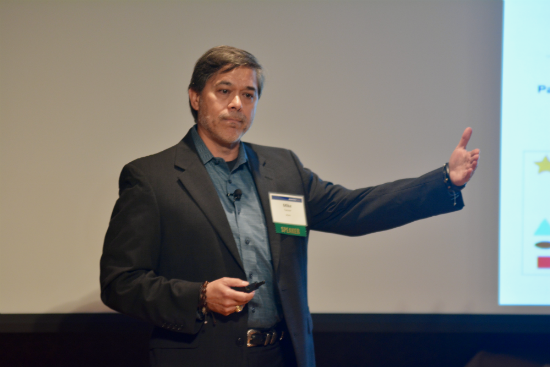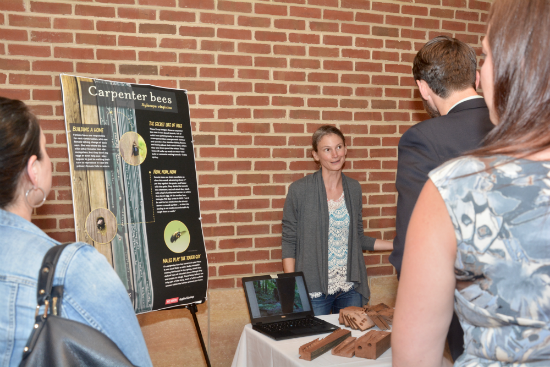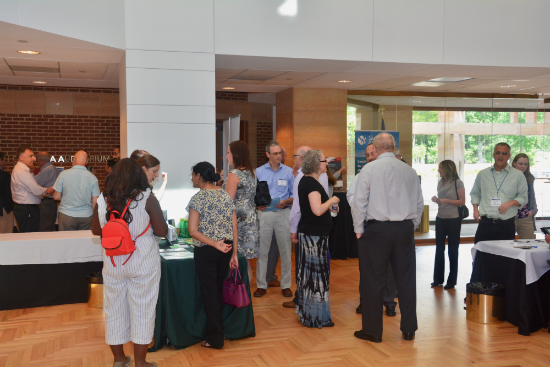
Weather You Like It or Not, Climate's the Focus of NCBiotech Ag Summer Social

The North Carolina Biotechnology Center tapped a little-known Asheville treasure to put a focus on climate for this year's Ag Tech Professional Forum Summer Social.
The annual event series promotes discussions of diverse agricultural and science topics, providing like-minded people with fun, networking and learning opportunities.
Keynote speaker Michael Tanner, director of the National Oceanic and Atmospheric Administration’s Center for Weather and Climate in Asheville, engaged attendees at the most recent event with stories of how data collected from the past 2,000 years have a direct impact on each individual’s decisions today.
As an accomplished scientist and communicator, Tanner knows the advantages of events like the summer social.

“It’s all about relationships and building relationships among your colleagues and your peers,” Tanner said. “Every once in a while an epiphany occurs where you have a common problem or you’re trying to make a business case on a common issue. The next thing you know you are working with one of those colleagues and leveraging off of each other.”
North Carolina's ag tech community gathered from across the state for this networking forum. A few attendees were present for the first time and most used the opportunity to meet peers who share similar interests and experiences. Elsa Youngsteadt, Ph.D., is an assistant professor at North Carolina State University who used the social as an opportunity to engage with both new and returning attendees about carpenter bees— many people stopped to view the bees’ infamous artwork.

For returning attendees, the summer social is a chance to meet up with old friends over a shared passion for science. Alan Kriz, Ph.D., from Bayer, and David Saravitz, JD, Ph.D., from the Williams Mullen law firm, have attended more times than they can remember.
“The only connection we have is this event,” Kriz said. “This is the only time we see each other. We’ve known each other for years.”
Kriz also commented on the inclusivity of the community and the event’s open-door policy. Everyone is allowed to register. “It doesn’t matter what the topic is—just come. Because you are going to learn something, and you are going to network.”
Speakers like Tanner present a new learning opportunity each year.
The Asheville-based National Centers for Environmental Information (NCEI) started collecting data in the 1940s and currently possesses enough information in its archives to fill 65 football fields covered with 120 GB smartphones. The information gathered is analyzed to assist both local and global individuals in decision-making throughout the day. Society makes decisions based on both current and older data—one person dresses according to the morning’s weather report while others coordinate their companies’ electrical decisions with past wind occurrences.

According to Tanner, extreme wind in California used to topple transmission lines and subsequently start wildfires. As a result, San Diego Gas and Electric paid billions of dollars in settlement fees. Eventually, the company turned to the NCEI for help.
“San Diego Gas and Electric use our wind data and our climate trends to figure out what the trends are going to be at a certain period of time,” Tanner said. “They actually shut down those transmission lines based on the information that we’re providing them. It is saving them $2 billion a year.”
Electrical companies aren’t the only entities to benefit from NCEI data. Recently, farmers discovered how to optimize fertilizer use to diminish the amount of waste collecting in rivers and streams, saving $1.7 billion a year.
In order to make those savings possible, clear communication is an important step. However, some challenges are discovered when explaining complex problems and solutions. Tanner acknowledged that many readers, when presented with data-filled spreadsheets, might be overwhelmed with the onslaught of figures. Therefore, scientists have learned to adapt.
“The reality is it’s not about data,” Tanner said. “It’s about information—how you take that data and communicate it. People today don’t want spreadsheets. What they want is infographics—charts that will give you the information so you can see it readily.”
For those interested in expanding their communication skills and participating in friendly scientific discussion, the next Ag Tech Professional Forum is Wednesday, Sept. 18, again at NCBiotech.
